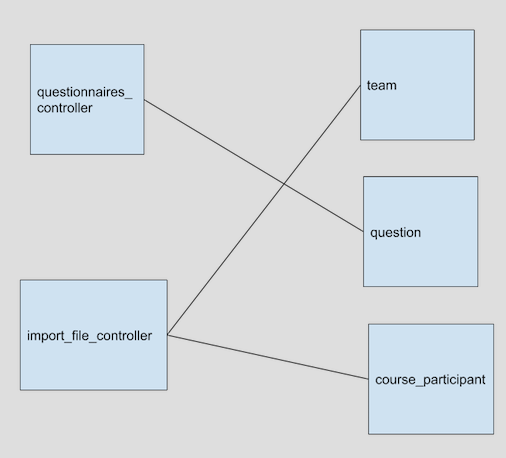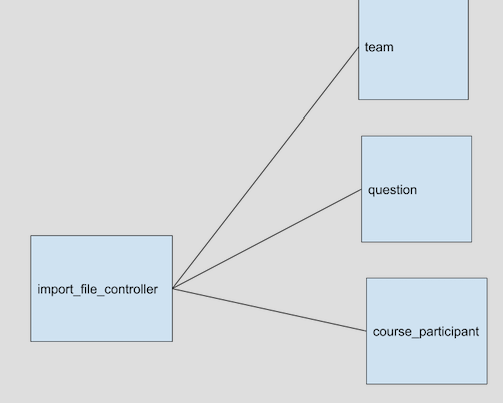CSC517 Spring 2019/E1923 New Framework For Import/Export
Project Introduction
Team
- Veeha Khanna, vkhanna
- Randy Paluszkiewicz, rpalusz
- Drew Marshburn, rdmarshb
- Andrew Miller, asmille5
Project Purpose
The export/import feature is the most helpful feature for instructors to set up assignments. The instructors usually have a list of students, teams, etc from their learning management system. Being able to export/import these into expertiza saves a lot of time when setting up an assignment.
Expertiza provides multiple export and import features for eg. export students, teams etc. Essentially what it does is it fetches some data from database and save it as a file in desired format. However, same functionality is implemented multiple times for exporting and importing different things.
The aim of this project is to design a generic export/import feature. What you need to do is implement a framework which supports exporting and importing functionality based on input. There are substantial degrees of freedom in this project. You need to design the module which will take the database table names, column names from which data needs to be exported or the imported into. So that this module can be used for every export/import feature that expertiza provides.
Most imports and exports just import or export a single table. But sometimes exports involve “details.” For example, when questionnaires are imported or exported, the “advice” (guidelines on what characteristics of work merit each score) may be imported or exported along with the questionnaire. I suspect that all instances of import/export of multiple tables are called “details” in the current code. Provide a mechanism so that “details” can be imported or exported along with the main table involved.
Existing Import Functionality
Existing import functionality is primarily routed through the import_file_controller and an import class method for various models.
SignUpTopic and User, rely on helper classes that extract attributes from a hash and create an ActiveRecord object.
Questionnaire relies on a helper method that can import Question objects (objects that make up a Questionnaire) from a CSV and adjust the size of the associated QuestionAdvice (the words that pop up after you pick a certain number of stars). However, these functions might be deprecated, as it appears that Question importing is now routed through the ImportFileController unsuccessfully. More detail about specific functions is provided below.
Controllers
- import_file_controller
- File processing methods:
- #get_delimiter - Sets proper delimiter for filetype
- #parse_line - Processes line (row) of the file
- #parse_to_grid - Turns file into 2D array
- #parse_to_hash - Turns file into hash where 'header' stores header row and 'body' stores all contents.
- #hash_rows_with_headers - Creates hash for each row of file. Keys are headers, values are row values.
- Import methods:
- #import_from_hash - Primary import functionality. Creates objects for hashed rows (from #hash_rows_with_headers).
- #import - Larger controller of import, sets error messages and displays.
- File processing methods:
- questionnaires_controller
- ::import - Allows import from CSV using QuestionnaireHelper (Appears to be deprecated/unused)
Helpers
- import_file_helper
- ::define_attributes - Sets and returns attributes for User object from hash.
- ::create_new_user - Makes a user object in the database.
- import_topics_helper
- ::define_attributes - Sets and returns attributes for a SignUpTopic from hash.
- ::create_new_sign_up_topic - Makes SignUpTopic objects in the database.
- questionnaire_helper (Appears to be deprecated/unused)
- ::get_questions_from_csv - Allows Question and QuestionAdvice import/creation with CSV file.
Models
All models have an ::import method called by the ImportFileController. In addition, SignUpTopic and User objects rely on their helpers, which are mentioned above.
- assignment_participant
- assignment_team
- course_participant
- course_team
- team
- metareview_response_map
- question
- review_response_map
- sign_up_sheet
- sign_up_topic
- user
Proposed Import Changes
The import functionality should be routed from the import_file_controller. Everything should still work as it does now after our changes. Luckily, most import functionality is routed through the ImportFileController and import class methods on models that are being imported. It makes sense for each model to have its own import method because each model is know what to expect for itself. Making things overly generic will end up contradicting the DRY principle.
We intend to remove other helpers and files, such as the ImportFileHelper, the ImportTopicHelper, and the QuestionnaireHelper to keep import routing consistent. We will also remove the QuestionnaireController and route that import through the ImportFileController. In addition, we will update ImportFileController methods (in particular, #hash_rows_with_headers and #import_from_hash) to make better use of polymorphism and eliminate large and unnecessary if/else blocks.
We will also insert more specific object creation specifications. Consider if a user's import contains objects that do not exist in the database. We will provide an option for the user to specify whether or not new/dependent objects should be created and account for this boolean in relevant ::import functions for the models.
To summarize our changes:
- Route all import traffic through ImportFileController and ::import calls on models.
- Refactor ImportFileController.
- Insert object creation conditions into all relevant ::import functions and into the ImportFileController form.
- Add ability for ImportFileController to import Question objects for Questionnaires. (Add question view to views/import_file, introduce Question logic into the controller.)
- Note: Why does QuizQuestionnaire have a different view?
Visually this is what is happening right now:
What we want it to look like:
What has been done so far
We have rerouted how the Questionnaire import works so that it now gets routed to the import_file_controller instead of the questionnaires_controller.
Existing Export Functionality
These are the files that contain an method with export in the name. The Export functionality, unlike the Import functionality, is different in every place it was implemented.
Controllers
- export_file_controller
- File processing methods:
- #find_delim_filename - Find delimiter and filename
- #start - Assign titles to models for display
- Export methods:
- #exportdetails - Exports details from assignments
- #export - Exports the options parameter for the following models: Assignment, AssignmentParticipant, AssignmentTeam, CourseParticipant, CourseTeam, MetareviewResponseMap, Question, ReviewResponseMap, User, Team
- #export_advice - Exports question advice data to CSV file
- File processing methods:
- 106_update_controller_for_export
- ::up - It seems to update permissions for export by for administrative assignments
- ::down - Empty method
Helpers
- export_file_helper
- It is empty
Models
All models have some kind of an ::export method:
- assignment
- assignment_team
- course_team
- metareview_response_map
- participant
- question
- review_response_map
- user
- team
- question_advice
Proposed Export Changes
The goal is to get all the export functionality in one place, the ExportFileController. The overall effect will be similar to what we hope to achomplish when updating the Import funcitonality.
We will work on Import before we start with Export.
Test Plan
Every controller we are amending has test cases corresponding to the import/export functionalities. Since we are rearranging import/export functionality and not re-creating it, at the moment, tests will similarly be rearranged so they keep passing and are being represented in the correct file.
If we end up adding new functionality we will add new tests.
Deployment
The project is deployed on an NCSU VCL server. It can be accessed at http://152.46.16.252:8080/.
A sample instructor login is:
- Username: instructor6
- Password: password

